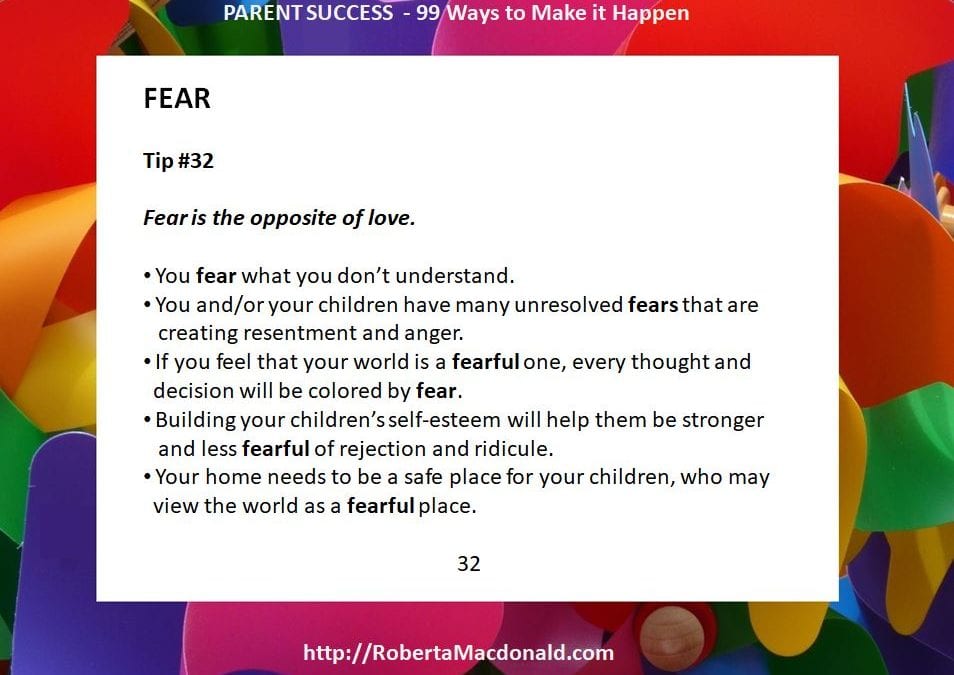
16 Parent Tips on Fear
16 Parenting Tips on Fear
A Fearful Parent….A Fearful Child!
Your home needs to be a safe place for your children,
who may view the world as a fearful place.
It is my firm belief that fear is the opposite of love. The sixteen Parenting Tips on Fear below are intended for you to first notice where fear may be showing up in the life of your child. Second, once noticed, you can begin taking action to reduce the amount of fear your child experiences in their daily lives.
- A parent may model a fearful attitude toward life which is picked up by the child. The parent may be overly fearful because of past traumas. As a therapist, I have seen children who were overly fearful and, on meeting the parents, saw how the unintentional modeling affected the children. Fear, then, becomes a family issue.
- If there is a lot of anger, resentment or depression, and other dysfunctional issues in the family, unresolved fears from the past could be the reason for these issues.
- Underneath upset is: anger, jealousy, resentment, revenge, deep disappointment and/or depression. Fear is underlying these emotions. Fear is underneath the upset and causing the negative behavior.
- Fear of the unknown, fear of not being in control or being controlled, fear of change, fear of criticism, and fear of being vulnerable or weak are some of the underlying fears.
- Fear may cause the child to act out with bad behavior. Parents need to find out what is causing the fear. After discovering what is causing the fear, it may take many positive discussions to help your child let go of the fear. If the fear was caused by a trauma, a good therapist may need to assist with the deeper fear issue.
- Your child fears what he or she does not understand. A small child needs to be reassured and patiently taught to let go of unrealistic fears, such as a monster under his or her bed. Your child needs to trust in the adults who have his or her best interest in mind.
- A child needs to understand that he or she is not alone and can reach out for help when needed. Without these reassurances and explanations fear can cause a child to conjure up and magnify a small worry or fear, creating a scary scenario in his or her mind.
- Is having a fearful or protective attitude wrong? It isn’t wrong but if you feel that your world is a fearful one, every thought or decision (or having no decision, no plan) will be colored by this fear. It is a negative stance in a mostly negative world.
- The child needs to have encouragement and positive role models. A child can’t have too many positive role models.
- Parents can protect their child without voicing their fears or pointing out what could go wrong. It is good to be cautious and realistic. However, being overly cautious and fearful can cripple the child’s dreams, ambitions, interests and motivation in creating his or her own life.
- What if the child has low self-esteem and is afraid to try anything new because of being fearful? It may take patient work but building your child’s self-esteem will help him or her be stronger and less fearful of rejection and ridicule.
- Help your child to recognize that he or she has inner strengths, personal power, and courage. Help your child find small successful ways to tap into their skills and talents. Often the child does not believe he can do something and chooses not even to try.
- If you are an encouraging parent you will help the child be successful in small ways so that larger steps can be taken later.
- Your child may be fearful that something will happen to his or her parents. He or she may be dwelling on the fear of death of the parents, or their own death. If this is the case, be careful what you say because kids often think literally. Listen and reassure them.
- My mother was afraid of deep water and would say when we would go swimming in the public swimming pool: “Don’t drown”. Those words have been with me all these years and it affected me. As an adult I have always stayed in the safe end of the pool, never venturing into the deep water. I made sure not to voice my fear of deep water around my children and they don’t have my fear.
- As protective parents, we always want our child to be safe when they enter the outside world that is often filled with difficult, dangerous and uncertain events and activities. Your home needs to be a safe haven for your children when they return every day. However, for those children who may view the world as fearful, they may stay longer in their home than is healthy for their well-being and development. They may not want to leave for fear of the outside world.
Activity:
Choose up to 5 of these tips to focus on this week. Consider journaling your thoughts and feelings. Let me know how you are doing. Let me know your thoughts in the Parent Success Facebook Group.
I will be hosting an on-line parenting course in the near future. To make sure you don’t miss it – Sign up to receive my email updates. Contact Me
As always, email me with any questions. Roberta@RobertaMacdonald.com
To Your Parenting Success
Roberta
Would you like these 16 tips in a downloadable pdf? Click here: Download 16 Parenting Tips on Fear
Up Coming Class:
Calming Down – A Daily Life Management Course
This course is a guided group discussion on how to gain a better understanding of the causes of anger and how to develop a less reactive, stressful way of life.
My Book: Parent Success: 99 Ways to Make It Happen, was written and used in many parent classes in the greater Seattle area for over 30 years. Roberta wrote the Parent Success book so that parents who are burdened with many parenting challenges and unexpected stressors will have a simple daily guide.
Get your copy through Amazon by clicking this link Parent Success: 99 Ways to Make It Happen
